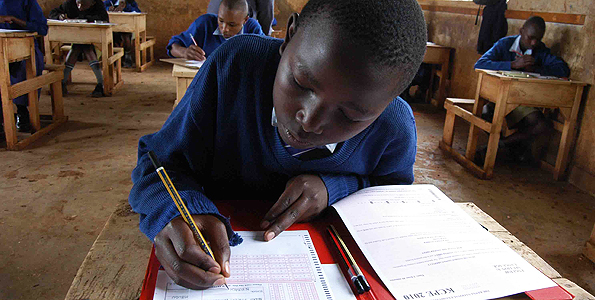Kenia / 08 de enero de 2017 / Por: JONATHAN WESAYA / Fuente: http://www.nation.co.ke/
When emerging and developing economies are discussing universal enrolment and retention, Kenya is at a crossroads with a system of education that is cannibalistic.
Since 2003, when free primary education was introduced, we have seen children in villages being taken to school, only for them to attain Es en masse, and we brand them failures after a decade-and-a-half of investment.
As a country, we are sitting on a ticking time bomb of wastage. A system of education that produces 33,000 candidates with Es after 12 years of schooling is a clear signal of failure.
We cannot afford to have over 50 per cent of any group of candidates sitting a national examination fail to transition to the next level. We must look at ourselves in the mirror and act.
When financial allocations are made, relevant policies passed and directives given to improve the efficiency of our education system but no follow-up is made, learners, caregivers, teachers and stakeholders lose out on the attendant benefits.
VALUE FOR MONEY
It looks like we have no time value for money in our education system. When policy is not seamlessly turned into practice to deliver quality education, wastage arises.
At the household level, when parents, guardians and caregivers fail to encourage learners to attend school consistently, they indirectly contribute to poor learning outcomes.
In educational terms, the wastage can be classified as internal or external. Internal wastage arises when children drop out of school or repeat classes.
The negative impact of such wastage has reduced due to free primary education grants and the Ministry of Education’s non-repetition policy.
However, we still have a very high dropout rate in the system due to hidden costs and external push and pull factors such as feeding programmes, drought, lack of quality teachers, cultural issues, and poor teacher-learner ratios.
External wastage is more serious in any education system. We have over one million children out of primary school, many in slums, with others in arid and semi-arid lands across the eastern and northern part of Kenya and rural villages in the country.
The 2014 Basic Education Statistical Booklet indicates that 20 per cent of children who enrol for Class One do not complete Standard Eight.
Of all the students admitted into Form One, only 48 per cent end up sitting the Kenya Certificate of Secondary Education examination in Form Four.
POOR LEARNING OUTCOMES
Seventeen counties — Baringo, Narok, West Pokot, Isiolo, Kilifi, Uasin Gishu, Nairobi, Kwale, Kajiado, Mombasa, Marsabit, Tana River, Samburu, Turkana, Garissa, Wajir and Mandera — are still operating below the national averages regarding gross enrolment and net enrolment rates at primary school level.
For the secondary school level, 21 counties — Lamu, Migori, Baringo, Trans Nzoia, Busia, Kilifi, Uasin Gishu, Kwale, Mombasa, Kajiado, Nairobi, Isiolo, West Pokot, Narok, Tana River, Samburu, Garissa, Marsabit, Wajir, Turkana and Mandera — are still far from the national averages on gross enrolment and net enrolment rates.
The wastage indicators are higher for boys than girls across the nation. This means the investment and drive towards the empowerment of girls are beginning to yield results but this is a stark reminder that we need to stand up for boys.
To address the internal system inefficiencies, we need to rethink how our teachers are prepared to undertake their noble job, manage them better and ensure they have quality contact with their learners. They should be in school and teaching.
A 2013 World Bank survey on service delivery in education in Kenya shows that there are some teachers who are present in school but absent in class. It was found that for every 100 public school teachers, only 55 were in class teaching, and 27 were in school but not in class.
The survey also found that senior teachers, who are more experienced and better educated, were not performing their curriculum delivery roles as they were undertaking Ministry of Education or Teachers Service Commission administrative duties by making returns or receiving operational updates away from their stations.
Fuente noticia: http://www.nation.co.ke/oped/Opinion/-Address-wastage-in-education-sector/440808-3508872-a6w5fyz/index.html






 Users Today : 11
Users Today : 11 Total Users : 35460364
Total Users : 35460364 Views Today : 14
Views Today : 14 Total views : 3419114
Total views : 3419114